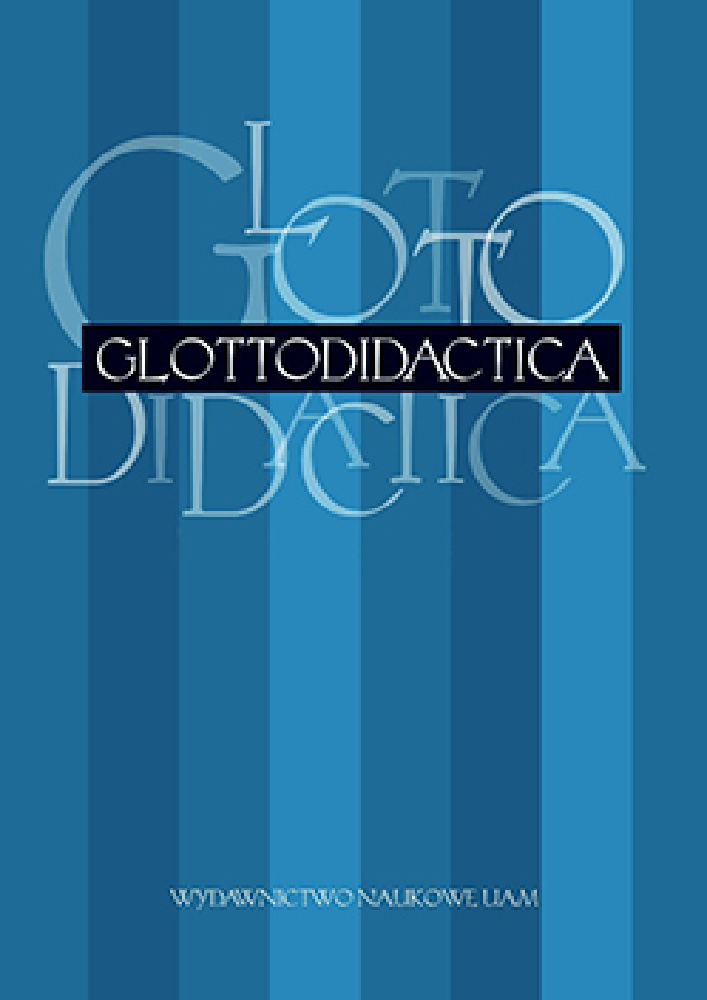Résumé
In this paper, the authors present an analysis of students’ narratives on their way to becoming competent English as a foreign language (EFL) users. Before presenting our study we refer to the ecological perspective on language learning/teaching, which may show the important impact of the learners’ environment for EFL development. We refer to studies which point to the importance of the environment for language learning and which used various methods of research. In our study, we apply a narrative approach. The collected corpus of narratives is analysed following the grounded theory within the psychological model of wellbeing, i.e. the PERMA model. Eventually, we decided to concentrate on the impact teachers have on learners’ emotions, engagement, meaning, relationships and accomplishment.
Références
Ary, D. / Jacobs, L. C. / Sorensen, C. K. / Walker, D. (2014). Introduction to research in education (9th edition). London: Wadsworth.
Benson, P. / Nunan, D. (eds.) (2004). Learner stories: Difference and diversity in language learning. Cambridge: Cambridge University Press.
Bielak, M. I. (2016). English language teaching and learning in the Polish high school classroom: Towards the elementary space of home. In: M. Krawiec (ed.), New insights into language teaching and learning practices (pp. 3–19). Regensburg: Sprachlit.
Bronfenbrenner, U. (1979). The ecology of human development. Cambridge, Mass.: Harward University Press. DOI: https://doi.org/10.4159/9780674028845
Common European framework of reference for languages: Learning, teaching, assessment (2001). Strasbourg: Council of Europe – Cambridge University Press.
Corbin, J. / Strauss, A. (2007). Basics of qualitative research (3rd edition). Thousand Oaks, CA: Sage.
De Wilde, V. / Eyckmans, J. (2017). Game on! Young learners’ incidental language learning of English prior to instruction. Studies in Second Language Learning and Teaching, 7 (4), 673–688. DOI: https://doi.org/10.14746/ssllt.2017.7.4.6
Francuz, G. (1999). O nową integrację wychowania. Ekologicznie zorientowana antropologia filozoficzna a wychowanie. Kraków: Oficyna Wydawnicza „Impuls”.
Fromm, E. (1956). The art of loving. New York: Harper & Row.
Ishihara, N. (2012). Critical narratives for teaching pragmatics: Application to teacher education. The European Journal of Applied Linguistics and TEFL, 2, 5–16.
Johnson, K. / Golombek, E. (2002). Teacher’s narrative inquiry as professional development. Cambridge: Cambridge University Press.
Kramsch, C. / Steffensen, S. V. (2008). Ecological perspective on second language acquisition and socialization. In: P. A. Duff / N. H. Hornberger (eds.), Encyclopedia of language and education. 2nd edition. Vol. 8: Language socialization (pp. 17–28). Springer Science + Business Media LLC.
Larsen-Freeman, D. (2015). Foreword. In: J. King (ed.), The dynamic interplay between context and the language learner (pp. xi-xiii). New York: Palgrave Macmillan.
Lemke, J. L. (2002). Language development and identity: Multiple timescales in the social ecology of learning. In: C. Kramsch (ed.), Language acquisition and language socialization. Ecological perspectives (pp. 68–87). London: Continum.
McCallum, F. / Price, D. (2016). Wellbeing for all. In: F. McCallum / D. Price, D. (eds.), Nurturing wellbeing development in education. From little things, big things grow (pp. 22–39). London, New York: Routledge. DOI: https://doi.org/10.4324/9781315760834
Oxford, R. (2015). What we can learn about strategies, language learning, and life from two extreme cases: The role of well-being theory. Studies in Second Language Learning and Teaching, 4 (4), 593–615. DOI: https://doi.org/10.14746/ssllt.2014.4.4.2
Oxford, R. / Cuéllar, L. (2014). Positive psychology in cross-cultural narratives: Mexican students discover themselves while learning Chinese. Studies in Second Language Learning and Teaching, 4 (2), 173–203. DOI: https://doi.org/10.14746/ssllt.2014.4.2.3
Pfeiffer, W. (2010). Esej o przywracaniu równowagi w glottodydaktyce polskiej. In: Z. Wąsik / A. Wach (eds.), Heteronomie glottodydaktyki. Księga jubileuszowa z okazji sześćdziesięciolecia urodzin prof. dr hab. Teresy Siek-Piskozub (pp. 75–85). Poznań: Instytut Filologii Angielskiej UAM.
Seligman, M. (2011). Flourish: A visionary new understanding of happiness and well-being. New York: Simon & Schuster.
Siek-Piskozub, T. (2016). The compatibility of positive psychology and the ludic strategy in the foreign language education. Glottodidactica, 43 (1), 97–106. DOI: https://doi.org/10.14746/gl.2016.43.1.7
Van Lier, L. (2010). The ecology of language learning: Practice to theory, theory to practice. Procedia Social and Behavioral Sciences, 3, 2–6. DOI: https://doi.org/10.1016/j.sbspro.2010.07.005
Williams, M. / Burden, R. L. (1997). Psychology for language teachers. A social constructivist approach. Cambridge: Cambridge University Press.
Licence
© Teresa Siek-Piskozub, Aleksandra Jankowska 2018

Ce travail est disponible sous licence Creative Commons Attribution - Pas de Modification 4.0 International.
Auteurs
Les auteurs de textes acceptés pour publication dans la revue Glottodidactica sont tenus de remplir, signer et renvoyer à l'adresse de la rédaction, un accord sur l'octroi d'une licence gratuite pour les œuvres, avec obligation d'accorder une sous-licence CC.
Conformément à cet accord, les auteurs des textes publiés dans la revue Glottodidactica accordent à l'Université Adam Mickiewicz de Poznań une licence non exclusive et gratuite et autorisent l'utilisation de la sous-licence Creative Commons Attribution-NoDerivatives 4.0 International (CC BY-ND 4.0).
Les auteurs se réservent le droit de disposer librement de l'œuvre.
Utilisateurs
Les utilisateurs d'Internet intéressés ont le droit d'utiliser les œuvres publiées dans la revue Glottodidactica depuis 2016, selon les conditions suivantes :
- Attribution – obligation de fournir, conjointement avec l'œuvre distribuée, des informations sur l'auteur, le titre, la source (lien vers l'œuvre originale, DOI) et la licence elle-même.
- Aucune modification – l'œuvre doit être préservée dans sa forme originale. Sans le consentement de l'auteur, il n'est pas possible de distribuer l'œuvre modifiée sous forme de traductions, publications, etc.
Les droits d'auteur sont réservés pour tous les textes publiés avant 2016.
Autres
L'Université Adam Mickiewicz de Poznań conserve les droits sur la revue dans son ensemble (mise en page, forme graphique, titre, conception de la couverture, logo, etc.).
A PARTIR DE L’ANNEE 2015, LES ARTICLES PUBLIÉS DANS LA REVUE SONT DISPONIBLES SOUS LICENCE CREATIVE COMMONS : https://creativecommons.org/licenses/by-nd/4.0/deed.fr





